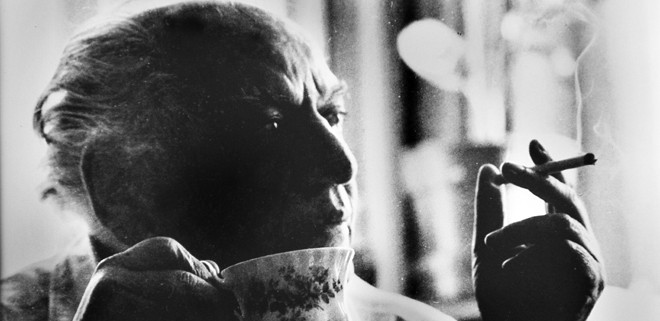

Faiz Sahib’s immense popularity often stands in the way of a critical appraisal of his works. His contribution to our literature and culture needs no endorsement from me. Faiz Sahib may have some detractors as a poet, but as a person he had the rare distinction of having no enemies. Even the dreaded plain clothes men from the department of criminal investigation treated him with respect, if not affection.
Faiz Sahib radiated what can only be described as ‘plain goodness’. His warmth, his humanity touched all those who came in contact with him. Whether they knew him well enough is neither here nor there. He made them feel at ease and they warmed upto him. He had the disposition of a saint. He spoke in measured tones. I never heard him raise his voice to drive a point home or to assert what he was saying.
* * * * *
Faiz Sahib was extremely fortunate. Unlike many other creative luminaries he did not have a painful childhood. He was brought up by a loving family in a well-off, well-adjusted, happy, caring home. There were no demons lurking in the family cupboard. He did not have to seek metaphors to break through the constricting walls of a tortuous relationship with an overbearing father. He chose to align himself with the deprived and down-trodden classes even though nothing in his childhood prepared him for this course of action.
Like other ‘modern’ poets of his generation, educated in British-run educational institutions, Faiz Sahib’s earlier verse was inspired by the romantic English poets, but even in his earlier poems while waxing eloquent about the ineffable radiance of a comedy maiden
he felt compelled to introduce his concern for his ideological trend. As Victor Kiernan wrote: "Faiz tries at times too deliberately to be progressive and writing verse more political than poetical."
Faiz Sahib became a leftist as a young man and remained so throughout his life. He believed in changing the social order. He envisioned a world in which man would no longer exploit man. He must have been disillusioned at some stage, but he never allowed doubt and despondency to creep into his poetic works. Loyalty was a paramount value in his social and philosophical make-up.
His tone never becomes strident. He speaks to us gently; he caresses our vulnerabilities and, more often than not, whispers affable sentiments into our ears. His voice is so gentle, so loving that we cannot help being swayed by it. It is only when he stops that we realize that what he was uttering was not sweet nothings but a cogent, well thought-out message. His expression conceals the anguish that he feels for the human condition:
The most unusual aspect of Faiz Sahib’s poetry is that even when he talks of the need for bringing sweeping changes in the established order he employs a language that is couched in traditional, doctrinal, religious symbolism. I can think of no other modern ‘progressive’ poet who draws so much from the prolific store of Islamic credo. (Josh Malihabadi comes to mind but Josh has a high-falution diction which mesmerises us with the panoply of its verbiage). Faiz Sahib adopted the manner almost as a stylistic device:
There is nothing abstruse in Faiz Sahib’s poetry. Indeed, at times, his verse is simplistic almost in the mode of a na’at-go.
Take these two couplets:
It is worth bearing in mind that Faiz Sahib’s use of phrases that evoke an ever-present fund of religious references is a subtle device to articulate his abiding passion for equality and social justice. When you hear him say:
he not only reminds us of the history of certain events -- events deeply embedded in the psyche of the Muslims -- he also makes a valid justification for protesting against the inequalities that exist in our society.
Islamic culture and its parables, its fables and its symbols assume an aesthetic quality in Faiz Sahib’s poetry. Faiz Sahib’s diction often transcends even the ideological goals that he had set for himself. His thinking was always a little more refined, a little more chiselled than his creed. His upbringing, his cultural growth was soaked in Islamic tradition, (few people knew that he had made a deep study of the Quran) and this remained evident in all his mature verse.
I am not suggesting that Faiz Sahib’s was an Islamic poet in the sense in which we call Eliot a Christian poet. What I am trying to suggest is that Faiz Sahib’s imagery remains traditional -- and like all traditional poets (Urdu and Persian) it is ensconced in Islamic symbolism. He was particularly fond of Sauda and you can detect shades of Sauda in his ghazals.
But Faiz Sahib was his own man and he created his own stamp, his own seal, and this seal was called out of scriptural and doctrinal terminology. He employed all the allusions that other classical poets did; the major difference is that into this terminology he wove a deeply humane and an intensely mellow message of love and good fellowship. You do not find a single example of rancour or bitterness in his poetry. He believed in a cause, but remained tolerant towards those who didn’t. It is this tolerance exquisitely crafted into his diction that has endeared him to millions of people in his own land -- and many who live beyond.
Of all the modern Urdu poets Faiz Sahib stands out as unique if only because, unlike his contemporaries, he did not give up the traditional poetic diction. He had a tranquil disposition, he was steeped in the classics, and he remained, throughout his life, an embodiment of patience and forbearance.
If I were to pinpoint Faiz Sahib’s poetic temperament I would quote